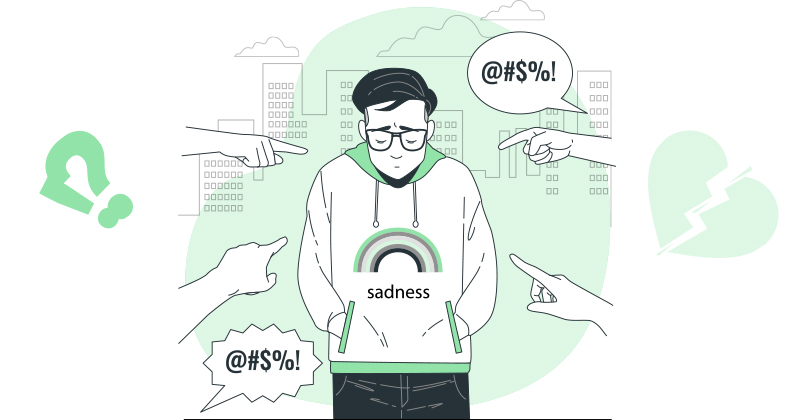How to Cope with Sadness When You’re Broke?

The situation you described can be characterized as a sense of relief and positive emotions when one’s basic needs are met through acquiring a sufficient amount of money. It’s natural to feel a sense of sadness or frustration when lacking the financial means to fulfill essential needs, as it can create a sense of insecurity, uncertainty, and potential obstacles in pursuing personal goals or projects.
When a significant sum of money becomes available, it can alleviate those immediate concerns and bring a sense of relief, hope, and empowerment. The newfound financial security can provide a foundation for moving forward with life plans and projects, as it removes the immediate barriers and allows for greater flexibility in decision-making and resource allocation.
Experiencing positive emotions after acquiring the necessary funds is understandable, as it signifies a shift from a state of limitation or deprivation to a state of greater possibility and opportunity. This change in circumstances can inspire motivation, optimism, and renewed enthusiasm for pursuing personal goals and aspirations.
It’s important to note that while financial resources can facilitate progress and provide a sense of stability, long-term well-being, and fulfillment often involve a balance of various factors, including relationships, personal growth, purposeful engagement, and emotional well-being. Money alone cannot guarantee sustained happiness or success, but it can contribute to a sense of security and enable individuals to pursue their goals more effectively.
Can I pursue my life goals with financial limitations?
Yes, it is possible to pursue your life goals despite limitations, including financial constraints. While financial resources can provide certain advantages, it is not the sole determinant of success or the ability to achieve your goals. Here are a few considerations:
- Clarify Your Goals: Take the time to clarify and define your life goals. Understand what truly matters to you and what you want to achieve in different areas of your life, such as career, relationships, personal development, and contribution to society. Having a clear vision of your goals will help you prioritize and focus your efforts.
- Identify Resources: While financial resources can be helpful, there are often alternative resources that you can leverage. Consider your skills, knowledge, networks, and time as valuable resources that can be utilized to move toward your goals. Look for opportunities to tap into these resources and maximize their potential.
- Develop a Plan: Create a strategic plan that outlines the steps you need to take to achieve your goals. Break down your goals into smaller, manageable tasks and identify the specific actions you can take within your current limitations. Prioritize your actions based on their impact and feasibility.
- Seek Knowledge and Skills: Look for opportunities to acquire knowledge and develop skills related to your goals. Explore free or low-cost educational resources, online courses, workshops, books, and mentorship opportunities. Leverage the power of self-learning and continuous improvement to expand your capabilities.
- Network and Collaborate: Build relationships and connect with like-minded individuals who share similar goals or interests. Collaborate with others who can offer support, guidance, or complementary skills. Networking and collaboration can open doors to opportunities, knowledge sharing, and mutual support, even without significant financial resources.
- Embrace Creativity and Resourcefulness: Adopt a mindset of creativity and resourcefulness to find innovative solutions within your limitations. Look for cost-effective alternatives, explore different approaches, and think outside the box. Sometimes, limitations can fuel creativity and lead to unexpected breakthroughs.
- Persistence and Resilience: Pursuing goals often involve challenges and setbacks. Cultivate persistence and resilience to overcome obstacles and keep moving forward, even when faced with limitations. Learn from failures, adapt your strategies, and maintain a positive mindset.
Remember that success is not solely determined by financial resources but by the combination of personal drive, determination, resourcefulness, and the ability to adapt to circumstances. While financial limitations may require additional effort and creative problem-solving, they should not deter you from pursuing your goals and dreams.
Video for How to Cope with Sadness When You’re Broke?
Check this video for OVERCOME DEPRESSION: TPowerful Motivational Speech Video (Featuring Dr. Jessica Houston) created by Motiversity
FAQs
How to deal with sadness when you're broke?
Dealing with sadness when you're broke can be challenging, but there are several strategies you can try. Focus on things that bring you joy and don't require spending money, like spending time with loved ones, engaging in hobbies, practicing gratitude, and seeking out free community events or activities. Remember that your worth isn't solely determined by your financial situation, and seeking support from friends, family, or mental health professionals can also be beneficial.
Tips for coping with financial stress and sadness.
Coping with financial stress and sadness involves both practical and emotional approaches. Create a budget to manage your finances better, explore ways to increase your income or find temporary work, and seek assistance from local charities or government programs. Emotionally, practice self-care, talk about your feelings with someone you trust, consider meditation or relaxation techniques, and remind yourself that tough times are temporary and you have the resilience to overcome them.
What are some inexpensive ways to boost mood when broke?
There are plenty of inexpensive ways to improve your mood without spending money. Take a walk in nature, listen to music, read a book, practice deep breathing exercises, cook a simple and nutritious meal at home, write in a journal, or engage in creative activities like drawing or crafting. Connecting with friends and sharing your feelings can also provide a mood boost.
How to manage emotions during financial difficulties?
Managing emotions during financial difficulties involves acknowledging your feelings, allowing yourself to grieve or experience sadness, and then taking proactive steps to address the situation. Practice mindfulness to stay present, set small achievable goals, remind yourself of your strengths, and consider seeking professional help if your emotions become overwhelming.
Are there any free or low-cost mental health resources for coping with sadness?
Yes, there are often free or low-cost mental health resources available. Many communities offer support groups, hotlines, or counseling services at reduced rates. Online platforms and apps also provide free guided meditations, self-help articles, and coping strategies for managing sadness and stress.
Ways to find support and community when you're broke and feeling down.
Look for local community centers, religious organizations, or online forums where you can connect with others facing similar challenges. Volunteering can provide a sense of purpose and help you meet new people. Engaging in activities you're passionate about can lead to new friendships and a supportive social circle.
How to stay positive and motivated while struggling financially?
Staying positive and motivated requires a mindset shift. Focus on gratitude for what you have, set achievable goals, break larger tasks into smaller steps, celebrate your accomplishments, and remind yourself of your past successes. Surround yourself with positive influences and engage in activities that uplift your spirit.
Coping strategies for emotional well-being during financial hardships.
Prioritize self-care, engage in regular physical activity, maintain a routine, practice mindfulness or meditation, connect with loved ones, and seek professional help if needed. Remember that seeking assistance is a sign of strength, and taking care of your emotional well-being is crucial during tough times.
Can meditation or mindfulness help with sadness when broke?
Yes, meditation and mindfulness can be helpful tools for managing sadness during financial difficulties. These practices can help you stay grounded, reduce stress, and cultivate a more balanced perspective on your situation. They encourage you to focus on the present moment and build resilience against negative emotions.
How to talk to friends and family about your emotional struggles due to being broke?
Be open and honest with your loved ones about your feelings. Choose a comfortable and private setting, express your emotions clearly, and let them know how they can support you. Focus on sharing your experiences rather than seeking solutions, and remember that your friends and family care about your well-being and are likely to offer their understanding and support.
Sharing is caring!







